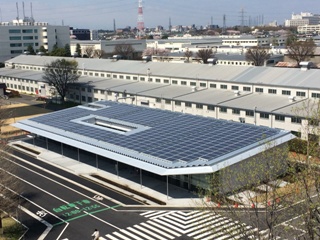Apr 7 2015
Toshiba Corporation today announced the opening of the Toshiba Group Hydrogen Energy Research & Development Center (HRDC) at its Fuchu Complex in western Tokyo.
 Hydrogen Energy Research & Development Center
Hydrogen Energy Research & Development Center
The new Center will concentrate Group-wide initiatives to realize a hydrogen economy, and will drive forward the development and demonstration of solutions integrating hydrogen-related energy technologies. Toshiba Group aims to increase the sales of hydrogen-related business to 100 billion yen by 2020.
Toshiba Group has essential technologies, including photovoltaic, wind, hydro and other renewable generation systems, water electrolysis systems and fuel cells, for achieving a hydrogen economy, a future where hydrogen is utilized as a low carbon clean fuel source. Toshiba Group will integrate these technologies in end-to-end solutions, extending from production to utilization of hydrogen.
Working towards the realization of local energy production for local consumption, Toshiba Group will develop a practical energy supply system that uses renewable energy to power hydrogen-generating water electrolysis systems, and then uses fuel cells to convert that hydrogen to electricity as and when needed. The system will be deployed in locations where electricity generation and transmission costs are high, such as isolated islands and remote places, so as to help cut costs and achieve a stable electricity supply.
Looking to the future, Toshiba Group also aims to establish a hydrogen supply chain by 2025. For example, hydrogen produced overseas at low cost, using large-scale windmills, will be used to generate electricity in hydrogen-fired gas turbine power plants in Japan. This will allow large amounts of hydrogen, a source of carbon-free clean electricity, to be stored and supplied without any need for a transmission line to connect the overseas power generation source, and Japan, the power consumption point.
Output from solar and wind power sources is unreliable, but it can be used to power water electrolysis systems that produce hydrogen, and that hydrogen can be transported and stored for use when needed. In addition to other applications, hydrogen is expected to be used as the fuel to for fuel cells, which can produce power and water in the event of a disaster.
The combined annual market scale for fuel cells and other hydrogen-related equipment and infrastructure is projected to reach 40 trillion yen by 2030.
The HRDC will install a solid oxide electrolysis cell (SOEC) being developed as a New Energy and Industrial Technology Development Organization project and use it in combination with solar photovoltaic generation systems, fuel cells and other apparatus to carry out demonstration experiments, toward achieving practical use. The center will also be an exhibition space for hydrogen-related technologies, in order to better understand customer needs.
Toshiba Group will draw on its wide-ranging technologies to promote a hydrogen business that helps to realize a low-carbon hydrogen economy.